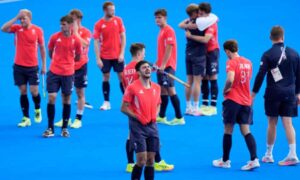
Lee Morton sat on the blue pitch and didn’t move for several minutes. Some teammates stood and watched India’s celebrations, stunned, with hands on heads. Others sank to their knees, unable to take it in.
A shootout defeat by India in the quarter-finals means 36 years of hurt will become 40 before Great Britain’s men next have a chance to break their barren Olympic run. But this was surely the most agonising exit of all since that golden moment in Seoul in 1988.
“It’s going to hurt for a long time,” said GB’s Northern Irish captain, David Ames. “If we’re honest with ourselves, we haven’t been as clinical as we want to, or need to be, if we want to be standing on podiums.”
GB came into this tournament full of promise. The mood music was upbeat under the relentlessly positive, Bazball-esque reign of head coach Paul Revington, the team rising to No 2 in the world. And when India’s Amit Rohidas saw red early in the second quarter, GB held all the cards.
But all of that promise and one-man advantage met its match in the second half, and then the shootout, when the world’s best keeper Sreejesh Parattu Raveendran lived up to his reputation and ended GB’s Olympic dream.
“It’s what great goalkeepers do,” said Ames. “They stand up when it’s needed. The big moments, they matter, especially when you get to these competitions and these moments in the knockouts.”
